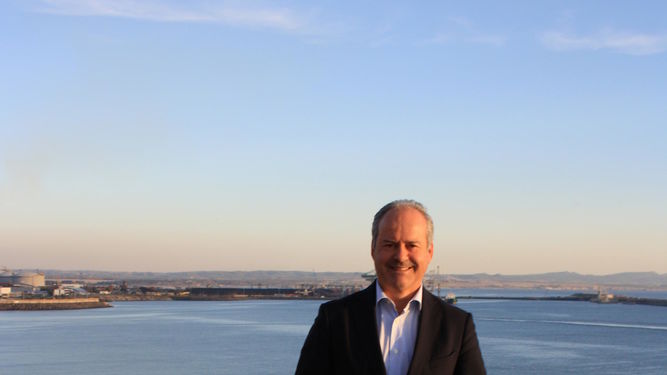-How was the port of Sines born?
-We are 40 years old. This port was born as a need to respond to the oil traffic of the Galp company. Later it modified its business strategy towards the petrochemical industry. About 20 years ago it was redefined to accommodate the needs of containerized merchandise. So we looked for operators who had an interest in the project.
-They have grown tremendously in the last five years. What is your secret?
-We have been the port that has grown the most in Europe in that time, as a result of the confidence of international operators in our technological capacity. We have also established an important hinterland that covers both Andalusia and other Spanish regions. However, we have to work to secure an Iberian market and conceive of it as a whole, the fruit of the single market. Andalusian companies can have an instrument in Sines to strengthen their competitive advantages.
-This growth has been experienced in the worst years of the crisis.
-In those years GDP stagnated, but nevertheless world trade increased. Globalization continues despite the crisis and there is more and more trade. So the ports continue to grow.
-Have you had aid from the Portuguese Government?
-In infrastructures outside the port, yes. Inside we have done everything ourselves and in a significant way private companies through concessions.
-Do you have political interference?
-Ports are private companies and public capital. We have great autonomy that makes us more efficient. Despite everything, we have a great relationship with local entities. But always with our autonomy.
-Do you know the Port of Huelva? Can Sines be an example for future developments here?
-Yes, I know him. We have different characteristics. You must study your own strategies, both the type of cargo they handle, and their hinterland, infrastructure, location, and define your business strategy and your market.
-However, there are similar characteristics between the two.
-The objective of the ports is to serve the economy of the area, its companies, and this must be clear when defining its strategy. When you make an investment you have to be clear about the characteristics in which you are strong. There must be previous work that we have already done in Sines to see the necessary investments.
-They have expansion plans that are more than serious, aiming at 7 million TEU.
-And we have the conditions for it. We speak of a market different from local economies, but on a global scale. Loads go where they are cheapest; what determines the chosen destinations are costs, especially logistics.
-Not only will they be a rival for Huelva, but also for Algeciras.
-The current terminal will double its capacity in four years, to reach 4 million containers. We are going to launch a competition next year for the new Vasco de Gama terminal, which in the first phase will have capacity for 3 million more than in 10 or 15 years could double it.
-The port is designed to grow without too many problems.
-Portugal has given value to its entire sea coast and has opted for Sines as the reference port of the country. We have adapted to new demands.
-How have they positioned themselves regarding Liquefied Natural Gas, which will be the next revolution in maritime transport?
-LNG will continue to grow in the coming years and the Government has considered it as a strategic transport. Sines began construction of its natural gas terminal in 2004, as LNG’s gateway to Europe and to minimize the risks of gas from Russia and Algeria. There is significant growth of LNG as a fuel for ships. It is a very competitive transport, both strategically and economically.
-They are going to have a competition in Huelva that is determined to bring the products from Extremadura that are now moved by Sines.
-The companies of Extremadura have more competitive advantages if they use the port of Sines and we believe that it will continue like this.
-Aren’t you afraid of running out of those traffics?
-Ports must be seen as an element of a value chain. Sines is a very important asset for companies in Extremadura. We have conditions and we offer logistics solutions for these companies. In any case, all ports have their option to build their logistics areas and offer alternatives for companies and that they choose.
-He talks about logistics very naturally. Assume it is the true tool that ports should offer.
-It is a concept that has changed in recent years. A port is not a place where a ship arrives, loads or unloads and departs.
-Ports are not stations like railway stations; there is an added value to take advantage of.
-Logistics are increasingly important and will be altered significantly in the coming years. The ship owners themselves have their operators in ports where they also have other businesses. The future will undoubtedly be marked by online businesses that have enormous growth. We have to be prepared to provide space on ships for companies like Amazon or Alíbaba. You have to know how to establish strategies to know how to respond to these new requirements. They will even have their own ships.
SOURCE: HUELVAINFORMACION.ES


